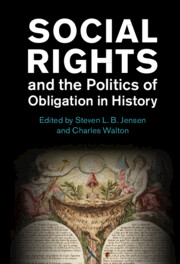 |
| Source: Clements Center |
Website of the European Society of International Law's Interest Group on the History of International Law.
ESIL Interest Group History of International Law

Monday, 31 January 2022
SUMMER SCHOOL: Summer Seminar in History and Statecraft (Clemens Center for National Security, University of Texas at Austin), 17-22 July 2022
PODCAST: Mary SAROTTE, Not One Inch: America, Russia, and the Making of Post-Cold War Stalemate (Brussels Sprouts
 |
| Source: Brussels Sprouts |
Friday, 28 January 2022
BOOK: Steven JENSEN & Charles WALTON, Social Rights and the Politics of Obligation in History (Cambridge University Press, 2022)
This pioneering volume explores the long-neglected history of social rights, from the Middle Ages to the present. It debunks the myth that social rights are 'second-generation rights' – rights that appeared after World War II as additions to a rights corpus stretching back to the Enlightenment. Not only do social rights stretch back that far; they arguably pre-date the Enlightenment. In tracing their long history across various global contexts, this volume reveals how debates over social rights have often turned on deeper struggles over social obligation – over determining who owes what to whom, morally and legally. In the modern period, these struggles have been intertwined with questions of freedom, democracy, equality and dignity. Many factors have shaped the history of social rights, from class, gender and race to religion, empire and capitalism. With incomparable chronological depth, geographical breadth and conceptual nuance, Social Rights and the Politics of Obligation in History sets an agenda for future histories of human rights.
Table of Contents:
BOOK: Gregory SHAFFER, Emerging Powers and the World Trading System The Past and Future International Economic Law (Cambridge University Press, 2022)
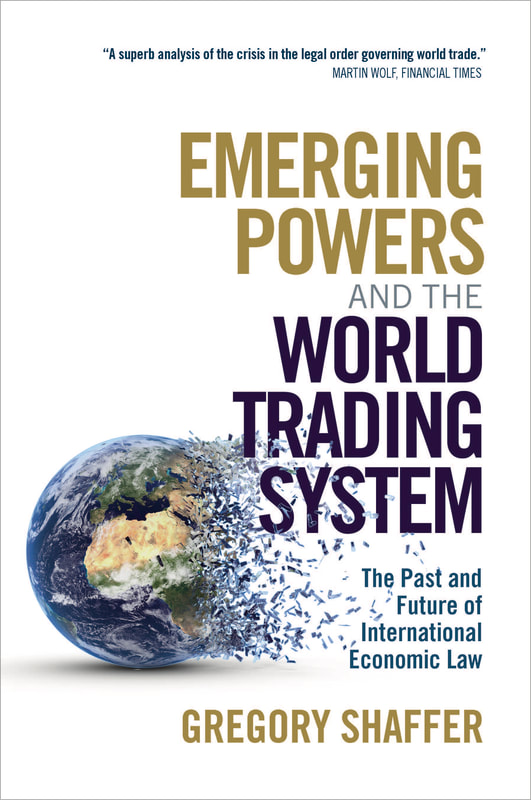 |
| Image Source: Author website |
Book description:
BOOK: Davide RODOGNO, Night on Earth: A History of International Humanitarianism in the Near East, 1918–1930 (Cambridge University Press, 2021)
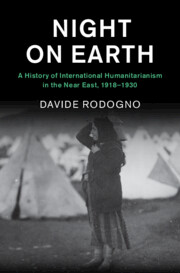 |
| Image Source: CUP |
BOOK: Fabian KLOSE, In the Cause of Humanity: A History of Humanitarian Intervention in the Long Nineteenth Century (Cambridge University Press, 2021)
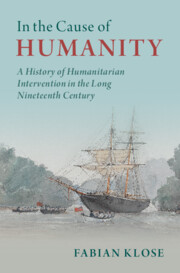 |
| Image Source: CUP |
Book description:
In the Cause of Humanity is a major new history of the emergence of the theory and practice of humanitarian intervention during the nineteenth century when the question of whether, when and how the international community should react to violations of humanitarian norms and humanitarian crises first emerged as a key topic of controversy and debate. Fabian Klose investigates the emergence of legal debates on the protection of humanitarian norms by violent means, revealing how military intervention under the banner of humanitarianism became closely intertwined with imperial and colonial projects. Through case studies including the international fight against the slave trade, the military interventions under the banner of humanitarian aid for Christian minorities in the Ottoman Empire, and the intervention of the United States in the Cuban War of Independence, he shows how the idea of humanitarian intervention established itself as a recognized instrument in international politics and international law.
Table of Contents:
Source: CUP
LECTURE: Anne ORFORD, International Law and the Politics of History, Lauterpacht Centre for International Law (4 February 2022)
 |
| Image Source: LCIL website |
LECTURE: Cait STORR, From Sacred Trust to Common Heritage: The Uncommons History of the Common Heritage of Mankind (31 January 2022)
Essex Public International Law Lecture: From Sacred Trust to Common Heritage
Mon 31 January 2022
09:00 - 10:30 (Zoom)
BOOK: Phillip DREW, Bruce OSWALD, Robert MCLAUGHLIN & Jeremy FARRALL, Rwanda Revisited Genocide, Civil War, and the Transformation of International Law (Brill, 2021)
| Image Source: Brill |
Book description:
In Rwanda Revisited: Genocide, Civil War, and the Transformation of International Law, the contributing authors seek to recount, explore, and explain the tragedy that was the Rwanda genocide and the nature of the international community’s entanglement with it. Written by people selected for their personalized knowledge of Rwanda, be it as peacekeepers, aid workers, or members of the ICTR, and/or scholarship that has been clearly influenced by the genocide, this book provides a level of insight, detail and first-hand knowledge about the genocide and its aftermath that is clearly unique. Included amongst the writers are a number of scholars whose research and writings on Rwanda, the United Nations, and genocide are internationally recognized.
Table of Contents:
Foreword
Author: Lieutenant-General the Honourable Romeo Dallaire
Pages: 1–2
Introduction
Authors: Phillip Drew, Jeremy Farrall, Rob McLaughlin, and Bruce Oswald
Pages: 3–14
Part 1 Rwanda, unamir and the International Community
Authors: Phillip Drew, Bruce Oswald, Rob McLaughlin, and Jeremy Farrall
Chapter 1 Rwanda’s Forgotten Years
Reconsidering the Role and Crimes of Akazu 1973–1993
Author: Andrew Wallis
Pages: 17–35
Chapter 2 Rwanda: the Political Failure of the UN Security Council
Author: Ambassador Colin Keating
Pages: 36–57
Chapter 3 Wilfully Blind: the Security Council’s Response to Genocide in Rwanda
Author: Tamsin Phillipa Paige
Pages: 58–68
Chapter 4 Underpowered and Mostly Unwanted
A Short History of unamir
Author: Jean Bou
Pages: 69–81
Chapter 5 Rwanda Revisited: unamir ii
Australian Reflections on the Mission and the Mandate
Author: Lieutenant-General J.J. Frewen
Pages: 82–98
Chapter 6 unamir: a Deployed Legal Officer’s Retrospective
Author: Bruce ‘Ossie’ Oswald
Pages: 99–118
Chapter 7 Do Not Intervene: unamir’s Rules of Engagement from the Inside
Authors: Phillip Drew and Major (ret’d) Brent Beardsley
Pages: 119–137
Part 2 The “G” Word
Authors: Phillip Drew, Bruce Oswald, Rob McLaughlin, and Jeremy Farrall
Chapter 8 Defining Genocide
Author: Melanie O’Brien
Pages: 141–158
Chapter 9 Rwanda, the Holocaust, and the Predictable Path to Genocide
Author: Phillip Drew
Pages: 159–177
Chapter 10 Moral Equivalence
The Story of Genocide Denial in Rwanda
Author: Linda Melvern
Pages: 178–186
Chapter 11 Gendering Rwanda
Genocide and Post-Genocide
Author: Adam Jones
Pages: 187–200
Part 3 Prosecuting Genocide
Authors: Phillip Drew, Bruce Oswald, Rob McLaughlin, and Jeremy Farrall
Chapter 12 The ictr and Its Contribution to the Revivification of International Criminal Law
Author: Emily Crawford
Pages: 203–214
Chapter 13 Post-Genocide Justice in Rwanda
Author: M.A. Drumbl
Pages: 215–229
Part 4 Rwanda’s Legacy
Authors: Phillip Drew, Bruce Oswald, Rob McLaughlin, and Jeremy Farrall
Chapter 14 Rwanda: Lessons Observed. Lessons Learned?
Author: Jane Boulden
Pages: 233–248
Chapter 15 Some Rules of Engagement Legacies of the 1999
Report of the Independent Inquiry into the Actions of the United Nations during the 1994 Genocide in Rwanda
Author: Rob McLaughlin
Pages: 249–290
Chapter 16 Rwanda and the Rohingya
Learning the Wrong Lessons?
Author: David J. Simon
Pages: 291–306
Chapter 17 Humanitarian Intervention and R2P
Author: Stacey Henderson
Pages: 307–324
(Source: Brill)
BOOK: John COLLINS, Legalising the Drug Wars: A Regulatory History of UN Drug Control (Cambridge University Press, 2021)
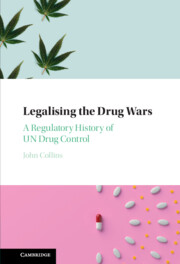 |
| Image source: CUP |
Book description;:
Where did the regulatory underpinnings for the global drug wars come from? This book is the first fully-focused history of the 1961 UN Single Convention on Narcotic Drugs, the bedrock of the modern multilateral drug control system and the focal point of global drug regulations and prohibitions. Although far from the propagator of the drug wars, the UN enabled the creation of a uniform global legal framework to effectively legalise, or regulate, their pursuit. This book thereby answers the question of where the international legal framework for drug control came from, what state interests informed its development and how complex diplomatic negotiations resulted in the current regulatory system, binding states into an element of global policy uniformity.
Table of Contents:
Historical Overview: The International Drug Control System pp xiv-xviii
Introduction pp 1-12
1 - Drug Diplomacy from the Opium Wars through the League of Nations, 1839–1939 pp 13-24
2 - International Drug Control in Wartime, 1939–1945 pp 25-69
3 - Creating the UN Commission on Narcotic Drugs, 1945–1946 pp 70-89
4 - Reconstructing Drug Control in Europe, Asia and the Middle East pp 90-112
5 - Old Battles Anew at the UN Commission on Narcotic Drugs, 1946–1948 pp 113-134
6 - Dividing Up the Global Licit Market, 1948–1953 pp 135-158
7 - From the 1953 Protocol to the 1961 Single Convention pp 159-188
8 - Assessing the Legal Legacy of the Single Convention pp 189-203
9 - Conclusion: UN Drug Control in the Twenty-First Century pp 204-224
Notes pp 225-267
Bibliography pp 268-276
Index pp 277-277
(source: CUP)
COURSE: Nathan NUNN, Stelios MICHALOPOULOS, Elias PAPAIOANNOU & Léonard WANTCHEKON, African history through the lens of economics
We have learnt of a free and open-access course on African history to which historians of international law and empire could contribute. The course discusses pre-colonial ethnic institutions, the slave trade, artificial colonial borders following the Scramble for Africa and decolonisation.
Read more on the Wheeler Intsitute for Business and Development's course website.
Description:
Views about Africa are, were, and most likely will continue to be highly polarising. Some economists, finance professionals, multinational executives, global entrepreneurs, and businesspeople are bullish, as there are investment opportunities in infrastructure, manufacturing, and technology, coupled with a young population that is increasingly more educated and confident. However, many are less optimistic, concerned about misgovernance, conflict, weak state capacity, corruption and poor infrastructure. Pessimists point to Africa’s dark past, including the atrocities and exploitation during colonisation, and the slave trades.
In 2000, The Economist called Africa “the hopeless continent”. A decade later, after strong growth and institutional advancement, it renamed it “the hopeful continent”. A few years later, in 2016, the magazine described it in more nuanced terms as a land of “1.2 billion opportunities” – a reference to the potential market that its huge population constituted. Economics research has followed a similar train. In the 1970s, 1980s, and 1990s, only a handful of papers were published outside specialised outlets. But, since the 2000s, a vibrant stream of research on African political economy and economic history has emerged. The new economic history approach departs greatly from prevailing thinking in important ways.
First, scholars realised that ill-conceived, post-independence urban-rural agriculture and trade policies, authoritarianism, conflict, corruption, and lack of structural transformation (the foci of pre-2000 studies) often had deep roots stemming from colonial extraction, enslavement, the artificial design of country borders, underinvestment, and cash-crop specialisation during colonisation.
Second, the new economics research became more interdisciplinary. For example, applied research started scrutinising influential ideas proposed by historians, political scientists, sociologists, and even cultural anthropologists.
Third, the studies began moving beyond purely economic outcomes and drivers of development. They examined, for example, the origins and the implications of the vast differences in social capital, civicism, cultural preferences, and values. This more evolutionary approach to economic history has led to a fruitful dialogue between economics and the other social sciences; albeit one not without tension.
Fourth, influenced by the ‘credibility revolution’ that started in labour economics in the 1990s and expanded to micro-development in the 2000s, research on economic growth and long-term development embraced the desire to identify causal effects – a far more challenging objective when working at macro scale relative to micro scale. Notwithstanding the challenges involved in forming reasonable counterfactuals for episodes such as colonisation or enslavement, research moved decisively from cross-country correlations to within-country analyses, which helped make progress on improving causal inference. Besides the more traditional cross-country designs, linking for example enslavement during Africa’s slave trades to contemporary development (Nunn 2008), a ‘meso’ approach merged that combined spatially disaggregated data from colonial archives with anthropological maps and contemporary administrative, survey and satellite imagery data, often exploiting within-country variation across regions (Michalopoulos and Papaioannou 2017a). Others took more-experimental micro-level designs tracing, for example, the impact of colonial schools across families and generations (Wantchekon et al. 2014). And we see increasing use of lab-in-the-field experiments and the use of self-conducted surveys, linked to historical phenomena like precolonial statehood (Lowes et al. 2017) and colonial violence.
Fifth, applied economics research has started to realise that African history is extremely complex. Centralised states with strong institutions emerged even in the midst of the slave trade. In addition, the colonial legacy is one of both extraction and repression that impeded development and of human capital investments boosting social mobility, often facilitating political mobilisation against colonialism.
This research agenda has produced a plethora of insights and has uncovered the shadow that Africa’s past casts on contemporary economic, social, and political development.
Course synopsis
The course, which is free and open-access, covers most of the major episodes in African history that economics research has analysed following a rough chronological timeline.
Pre-colonial era. While we do not know much about Africa before the Columbian exchange and the advent of European influence, some recent studies that we plan to cover have used anthropological maps and archival information to study the contemporary role of:
- African pre-colonial ethnic institutions and the ecological (Fenske 2012) and geographic (Fenske 2013a) origins of the disease environment of African states (Alsan 2015).
- Ancestral lifeways and the impact of the mode of economic activity on development and conflict (McGuirk and Nunn 2021).
- Social structure (Moscona and Seck 2021), lineage (Moscona et al. 2020), and the impact of cultural norms such as polygyny (Fenske 2013b) and supernatural belief on long-run development.
The slave trades. Sub-Saharan Africa’s interactions with Europeans began during the slave trades. During the transatlantic slave trade, the most widely known, about 12 million Africans were shipped to the Americas; while about 8 million more were enslaved during the East Africa, the Red Sea, and the trans-Saharan slave trades. Nunn (2008) merged shipment data on slaves’ ethnic affiliation (besides port) with anthropological maps (compiled by prominent anthropologist George Peter Murdock) delineating African ethnic boundaries, and then examined the association between economic wellbeing and slave-trade intensity. A striking negative correlation between output per capita and slave-trade intensity emerged, revealing enslavement’s lasting adverse consequences. Africa’s population was massively impacted, shaping family and social organisation. Follow-up work delving into underlying mechanisms uncovered the deleterious consequences of the slave trades on trust, underinvestment in education, financial underdevelopment, authoritarianism and conflict (Nunn 2017).
The Scramble for Africa. A key aspect of colonisation was the absurd borders that Europeans drew in imprecise maps in the late 19th century when they carved up the largely unexplored continent. British Prime Minister Lord Salisbury put it bluntly: “We have been engaged in drawing lines upon maps where no white man’s feet have ever trod; we have been giving away mountains and rivers and lakes to each other, only hindered by the small impediment that we never knew exactly where the mountains and rivers and lakes were”. With some exceptions, the colonial borders persisted as African independence leaders and departing Europeans did not want to touch the issue in the 1950s. State artificiality, as reflected in the straightness of borders or the share of a country’s population belonging to an ethnic group that was split by colonial borders, has been shown to be a strong predictor of economic underdevelopment. War, repression and violence against civilians are concentrated in the historic homelands of partitioned by artificial colonial borders, within which ethnic groups are considerably more likely to face state repression and engage in civil wars with an explicit ethnic angle.
Colonisation. Research has tended to concentrate on the colonial era which, although relatively short-lived, had important effects on economic development following independence. The old debate about the impact of European colonisation in Africa has come into the spotlight again recently, as exemplified by demonstrators attacking the statutes of well-known imperialists, such as Belgian King Leopold II, who ruthlessly ruled Congo as his private fiefdom in the late 19th century, and Cecil Rhodes, who embodied imperialism more than any other. Empirical research in economics has studied its various facets:
- Colonial extraction, oppression and violence; looking at, for example, King Leopold’s rule of Congo (Lowes and Montero 2020) and French repression in Madagascar (Garcia-Ponce and Wantchekon 2018).
- Indirect rule that not only shaped economic and political development during colonisation, but also appears to have had lasting consequences as chiefs maintained their influence post-independence (Acemoglu et al. 2014), when African countries entered a vicious cycle of conflict-poverty-autocracy.
- The construction of colonial roads and railways (Jedwab et al. 2015) turned out to be beneficial; however, the impact of transportation and other investments (Huillery 2009) was small and local as European transportation investments were minimal and lacked any development strategy, since the primary objective was exporting resources and agriculture output. Perhaps most importantly, the limited investments came at a huge cost as Europeans and their local collaborators tortured, killed and incarcerated thousands of Africans.
- Christian missions played a major role, promoting not only religion (Nunn 2010) but also education and human capital (Wantchekon et al. 2014). Their influence appears lasting as their legacy continues to shape literacy, moral values, gender roles (Nunn 2012), social capital, and interpersonal trust (Okoye 2020).
Decolonisation and early independence. We will then move to decolonisation and the early post-independence period, when there was widespread optimism for the future of Africa. The independence movements (Garcia-Ponce and Wantchekon (2017), their type, as well as their leaders, had important effects on the political system. We will also touch upon the Pan-Africa ideology (Akyeampong 2017) and the nation-building efforts of leaders such as Julius Nyerere and Kwame Nkrumah (Miguel 2011). From the onset of independence, Africa became a Cold War battleground (Berger et al. 2013), which had dire consequences. While the international community tried to promote much-needed structural transformation and industrialisation, in many instances foreign aid did little to help development (Easterly 2008) and in some cases made things worse, leading to prolonged conflict (Nunn and Qian 2014).
African opportunity and looking to the future. We will conclude with a mapping of African opportunity, as seen in intergenerational mobility in education (Alesina et al. 2021), which reflects deep historical and geographical factors that differ across and within countries, and across religious and ethnic lines. We will then discuss cultural features, Africa’s latent assets, meritocracy, the scepticism of authority, and the cosmopolitanism that can serve as the engines of robust growth in the decades to come.
(Source: VoxEU)
BOOK: Michael BARNET, Jon PEVEHOUSE & Kal Raustiala, Global Governance in a World of Change (Cambridge University Press, 2021), 300 p.
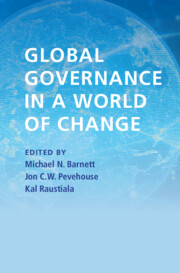 |
| (Image Source: CUP) |
Global governance has come under increasing pressure since the end of the Cold War. In some issue areas, these pressures have led to significant changes in the architecture of governance institutions. In others, institutions have resisted pressures for change. This volume explores what accounts for this divergence in architecture by identifying three modes of governance: hierarchies, networks, and markets. The authors apply these ideal types to different issue areas in order to assess how global governance has changed and why. In most issue areas, hierarchical modes of governance, established after World War II, have given way to alternative forms of organization focused on market or network-based architectures. Each chapter explores whether these changes are likely to lead to more or less effective global governance across a wide range of issue areas. This provides a novel and coherent theoretical framework for analysing change in global governance.
Table of Contents:
ARTICLE: John Fabian WITT, The View from the U.S. Leviathan: Histories of International Law in the Hegemon
Abstract:
Histories of international law more or less follow the epistemic position of the jurisdiction in which they arise. The parochial Anglophone student of the comparative literature in the history of international law instantly sees a version of this phenomenon in action. With notable exceptions, even sophisticated work in the history of international law in the U.S. is importantly different from English-language work in the same field that has begun to pour out from scholars based in the U.K., Australia, New Zealand, Canada, and elsewhere. In this chapter, I propose that this is because U.S. scholars since at least the Second World War have taken up the history of international law through a set of questions and presuppositions structured by a standpoint inside the leviathan. The most powerful player on the international stage – the United States – has exerted a gravitational pull on scholars writing the history of international law and on the functions that such histories serve. In recent years, however, the cross-border professionalization of the field is helping produce histories increasingly further afield from, or at least in a newly complex relationship to, the epistemic domination of the hegemon.
Read more on SSRN.
Thursday, 27 January 2022
BOOK: Vincent BOYER, Promesse tenue. Agir par devoir [Philosophies contemporaines; 11] (Paris: Classiques Garnier, 2021), 394 p. ISBN 9782406100928, € 39
Book abstract:
Cet ouvrage prend en charge le problème du motif du devoir en philosophie morale et montre qu’une approche, qui part non pas d’une théorie générale du bien moral, mais d’une pratique particulière, celle de la promesse, permet de mieux comprendre ce que signifie agir par devoir.
Read more with the publisher (DOI 10.15122/isbn.978-2-406-10094-2)
CALL FOR PAPERS: The Dynamics of Early Modern Colonial Laws and Legal Literature (Helsinki: Faculty of Law, 26-28 OCT 2022)
The conference organizers invite papers exploring how legislative strategies of early modern colonial empires affected each other, what they had in common, and how colonial laws emanating both from Europe and the colonies themselves developed into different directions. Conference papers will look at early modern colonial legislation of the empires in multiple contexts: medieval inheritance of ius commune and legal pluralism; early modern transformations of legal orders, such as the growth of police regulation; and not the least, the local colonial realities and normativities.
Connected to the last point, contributions investigating local readings of “foreign” legal literature will also be welcome. One may ask what role legal literature had in the circulation of legal rules and concepts, and in confronting societal challenges. Examples from court practice and legislative bodies highlight these complex processes. “Legal literature” will not be understood in the sense of being strictly dogmatic or methodological, but in the broad sense of personally constructed texts on law, written for legal practitioners, both academically trained lawyers and laymen.
This conference will bring together legal scholars, historians, and social scientists to explore the complex entanglements of early modern colonial laws.
Confirmed keynote speakers are professors Thomas Duve (Max Planck Institute for Legal History and Legal Theory, Frankfurt) and Andréa Slemian (University of São Paulo).
The conference is organized jointly by two projects, Comparing Early Modern Colonial Laws: England, the Netherlands, Portugal, and Spain (Academy of Finland, University of Helsinki) and Reading Law Glocally: Local Readings of Foreign Legal Literature in a Globalized World (Seventeenth to Early Twentieth Centuries) (Centre National de la Recherche Scientifique / France, Ghent University, University of Helsinki, Universidad Autónoma de Madrid). The conference committee consists of professors Laura Beck (Universidad Autónoma de Madrid), Serge Dauchy (Centre National de la Recherche Scientifique), Georges Martyn (Ghent University) and Heikki Pihlajamäki (University of Helsinki).
Please send, in one file, your abstract (max. 300 words) and short CV to the address: heikki.pihlajamaki@helsinki.fi. The language of the conference is English. There is no registration fee. The organizers will consider applications for reimbursement of travel costs and/or accommodation for junior researchers presenting papers. Participation online will be possible, and publication of the conference papers is foreseen.
The deadline for submissions is March 31, 2022.
(Source: ESCLH blog)
Wednesday, 26 January 2022
BOOK: Sara LORENZINI, Umberto TULLI and Ilaria ZAMBURLINI, The Human Rights Breakthrough of the 1970s The European Community and International Relations
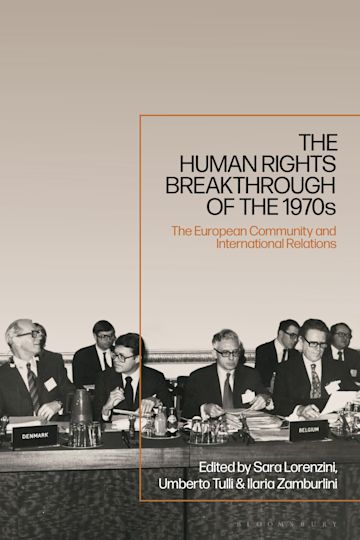 |
| (Image Source: Bloomsbury) |
Abstract:
During the 1970s human rights took the front stage in international relations; fuelling political debates, social activism and a reconceptualising of both East-West and North-South relations. Nowhere was the debate on human rights more intense than in Western Europe, where human rights discourses intertwined the Cold War and the European Convention on Human Rights, the legacies of European empires, and the construction of national welfare systems. Over time, the European Community (EC) began incorporating human rights into its international activity, with the ambitious political will to prove that the Community was a global “civilian power.”This book brings together the growing scholarship on human rights during the 1970s, the history of European integration and the study of Western European supranational cooperation. Examining the role of human rights in EC activities in Latin America, Africa, the Mediterranean, Eastern Europe and the Soviet Union, The Human Rights Breakthrough of the 1970s seeks to verify whether a specifically European approach to human rights existed, and asks whether there was a distinctive 'European voice' in the human rights surge of the 1970s.
Table of Contents
Introduction: the place of human rights in European integration, Sara Lorenzini, Umberto Tulli, and Ilaria Zamburlini
Part I: The European community and human rights violations in the world
1. Knocking on Europe's doors: Community Europe and human rights after dictatorial rule in Southern Europe, 1974-1977, Victor Fernandez Soriano
2. Introducing human rights within development cooperation policies: the European Community between the United States and the Soviet Union, Ilaria Zamburlini
3. A reluctant promoter: The EC, CSCE and human rights in East-West relations, Umberto Tulli
4. EC member states' stance on human rights issues: The perspective from the UN General Assembly, 1970-9, Lorenzo Ferrari
Part II: Member States, supranational institutions, European parties
5. The European Union of Christian Democrats and the controversy regarding the Spanish accession to the EC in the 1970s: the human rights problem, MariaLuisa Sergio
6. The Socialist Group of the European Parliament and human rights in the second half of the 1970s, Christian Salm
7. An awkward parter?: Britain's human rights policy and EC relations, 1977-9, David Grealy
8. Between Restrictiveness and Humanitarianism. EC institutions and the asylum policies of the 1980s, Gaia Lott
Part III: Other Europes
9. Human rights NGOs in Western Europe and the intervention of the Council of Europe in the Nigerian Civil War, Oluchukwu Ignatus Onianwa
10. Beyond victims of communism?: Austria and the human rights question in the 1970s, Maximilian Graf
Part IV: After the breakthrough: the European Union and human rights
11. The Twelve and the 1993 World Conference on Human Rights, Elena Calandri
12. The European Union's Influence on the Dutch position in the United Nations Human Rights Commission, Peter Malcontent
Read more on the publisher's website.
BOOK: Nicholas MULDER, The Economic Weapon: The Rise of Sanctions as a Tool of Modern War
 |
| (Image Source: Yale University Press) |
Abstract:
Economic sanctions dominate the landscape of world politics today. First developed in the early twentieth century as a way of exploiting the flows of globalization to defend liberal internationalism, their appeal is that they function as an alternative to war. This view, however, ignores the dark paradox at their core: designed to prevent war, economic sanctions are modeled on devastating techniques of warfare.
Tracing the use of economic sanctions from the blockades of World War I to the policing of colonial empires and the interwar confrontation with fascism, Nicholas Mulder uses extensive archival research in a political, economic, legal, and military history that reveals how a coercive wartime tool was adopted as an instrument of peacekeeping by the League of Nations. This timely study casts an overdue light on why sanctions are widely considered a form of war, and why their unintended consequences are so tremendous.
Nicholas Mulder is an assistant professor of modern European history at Cornell University and regular contributor to Foreign Policy and The Nation.
Read more on the publisher's website.
BOOK: William E. BUTLER, Hugo Grotius on War and Peace in English Translation (Clark (New Jersey): Talbot Publishing, 2021), VIII + 162 p. ISBN 9781616196615, 95 USD
The seven principal English-language versions of Grotius's classic work On the Law of War and Peace (1625) were published between 1654 and 1928. Either by design or serendipity, each of these appeared on the eve of, during, or immediately after a major international conflict. All major achievements in their time, they expressed an overriding conviction that Grotian insights would enlighten present-day readers and help to lessen the incidence and horrors of armed conflict. Drawing upon archival sources never used previously, this study considers the history of these translations and their different approaches to Grotius's often complicated text. William E. Butler has written extensively on the history of international law and is the founding editor of Jus Gentium: Journal of International Legal History (2016-). He is the John Edward Fowler Distinguished Professor of Law, Dickinson Law, Pennsylvania State University, Professor Emeritus of Comparative Law in the University of London (University College London), Foreign Member, Russian Academy of Natural Sciences and Foreign Member, National Academy of Sciences of Ukraine and National Academy of Legal Sciences of Ukraine.
(source: Lawbook Exchange)
